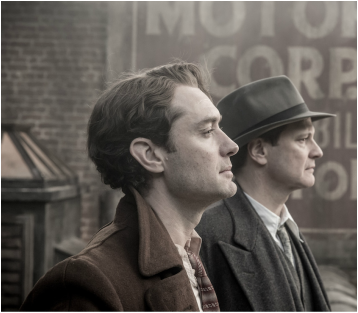Review:
"Genius"

Release Date: June 17, 2016
Rating: PG-13 Running Time: 104 minutes A good book editor maketh the best-selling author, or so the fact-based drama Genius appears to believe. The genius presumably in question is Thomas Wolfe, the author of 1929’s “Look Homeward, Angel” and 1935’s “Of Time and the River.” His literary editor was Maxwell Perkins, who counted F. Scott Fitzgerald and Ernest Hemingway among his authors at the publisher Scribners. Based on the book “Max Perkins: Editor of Genius” by A. Scott Berg, director Michael Grandage and screenwriter John Logan also position Perkins as a genius in his own way for his ability to pare down Wolfe’s beautifully written but long and occasionally superfluous prose. As Genius recounts, Perkins took a shot on Wolfe by publishing the North Carolinian’s semi-autobiographical “Look Homeward, Angel,” a manuscript everyone and their brother rejected because it was too long and difficult to edit. Perkins then spent multiple years editing down Wolfe’s 5,000-page manuscript “Of Time and the River” into a bigger commercial smash than “Look Homeward, Angel.” Starring Jude Law as Wolfe and Colin Firth as Perkins, Genius is a half-successful attempt to examine one man’s artistic process and another man’s efforts to keep a genius focused and his vision intact. “Editors should be anonymous,” says Perkins to Wolfe just as “Of Time and the River” is about to go to the printer. In Genius, Perkins may be anonymous to his authors’ readers but his authors hold him in high regard. Except Wolfe, who slowly comes to believe Perkins has compromised his work. Wolfe is depicted in Genius as a writer with a unique voice—but also as a brash, pompous man in desperate need of being reined in. Perkins is the polar opposite of Wolfe: he’s calm and in tune with his authors’ needs. He chooses his words so carefully that he could be accused of self-editing everything he says. If Perkins serves as Wolfe’s sounding board, Wolfe’s companion Aline Bernstein serves as a jealous, resentful voice of caution. She feels so slighted by Wolfe when he turns to Perkins for counsel that she all but wishes Perkins will one day find himself in the same position. The problem with Genius is that it is a biography that relies solely on words to drive its narrative, not action. There’s not much drama to be found in Perkins cajoling Wolfe time and again to edit down a manuscript that stands as tall as a book shelf. The constant back and forth between Wolfe and Perkins about writing process, and the world’s need for poets, quickly becomes repetitive and monotonous. Too bad Perkins isn’t around to take his pen to John Logan’s screenplay. It also doesn’t help that Genius puts us firmly in Perkins’ corner the first—and certainly not the last time—Wolfe blows into his office with the strength of a hurricane. Wolfe may be a writer in a class of his own but he’s portrayed as a nightmare to work with in Genius. As Wolfe, Jude Law is overly theatrical even for an author who freely admits to his editor that he’s loud and grandiose. Conversely, Firth is so quiet and measured that you suspect he’s trying as hard as he can to tune out Law’s babbling. When it comes to playing Americans, though, hard to tell whether Firth’s bland New York accent is worse than Law’s Southern drawl. Genius also does a disservice to Nicole Kidman, who, as Aline Bernstein, is once again typeset as a neglected ice queen with spite in her heart. “Human beings aren’t fiction,” Bernstein tells Wolfe during one fight. Sadly, this factual account of Wolfe and Perkins’ working relationship is never as compelling or as eloquently composed as Wolfe’s fiction. Robert Sims Aired: June 16, 2016 Web site: http://www.genius-thefilm.com |
|
